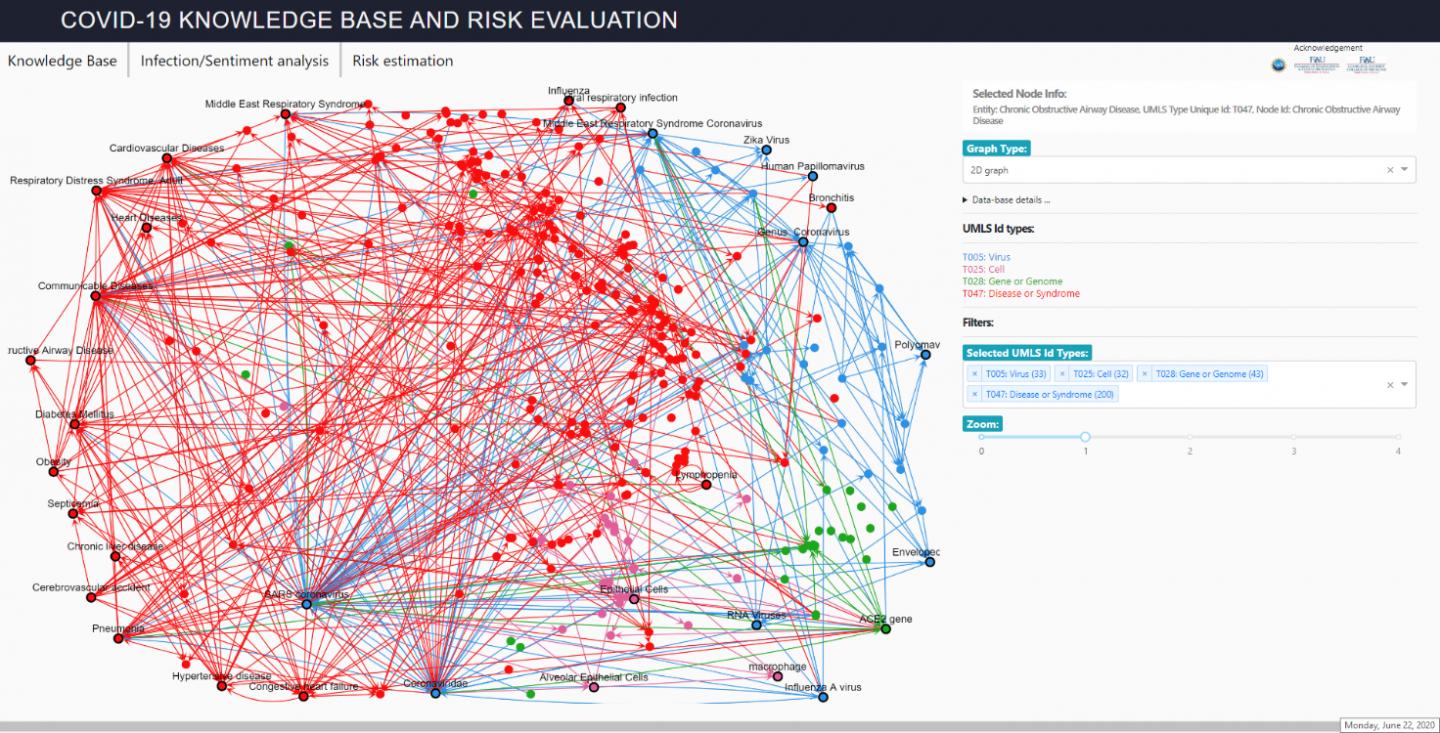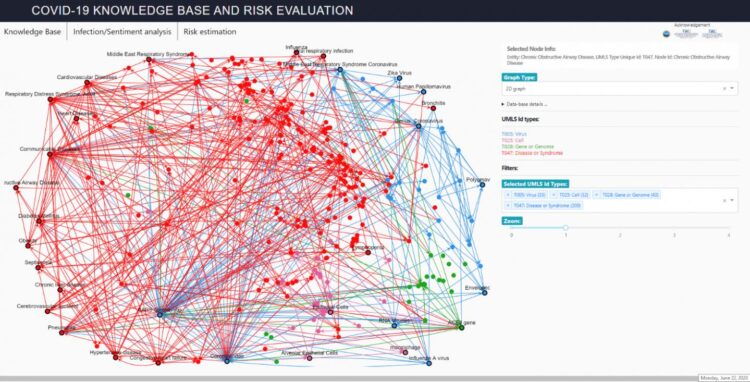FAU’s College of Engineering and computer science machine learning project receives NSF rapid grant

Credit: Florida Atlantic University
Researchers from Florida Atlantic University’s College of Engineering and Computer Science, in collaboration with FAU’s Schmidt College of Medicine, have received a one-year, $90,000 National Science Foundation (NSF) RAPID project grant to conduct research using social networks and machine learning, facilitated by molecular genetics and viral infection, for COVID-19 modeling and risk evaluation. The project will create a web-based COVID-19 knowledge base, as well as a risk evaluation tool for individuals to assess their infection risk in a dynamic environment.
“COVID-19 is an evolving epidemic and there is little knowledge about its outbreak and spread patterns, or the impact of viral evolution, demography, social behavior, cultural differences, and quarantine policies regarding these outbreaks,” said Stella Batalama, Ph.D., dean of FAU’s College of Engineering and Computer Science. “As the battle against COVID-19 continues, a deluge of information is being produced. As a result, the dramatic outbreak differences with respect to diverse geographies, regional policies, and cultural groups is raising confusion, contradictions, and inconsistencies in disease outbreak modeling.”
The FAU project, “RAPID: COVID-19 Coronavirus Testbed and Knowledge Base Construction and Personalized Risk Evaluation,” will address these discrepancies by building a knowledge base of COVID-19 to understand the correlations and roles that different factors play in predicting the spread of the virus. The technology will result in the implementation of appropriate policies to mitigate the effects of the epidemic on public health and society-at-large.
“Academia, news agencies, and governments are continuously publishing advances in the understanding of the virus’ clinical pathologies, its genome sequences, and relevant administrative policies and actions taken. In addition, the public also responds to the changing environments through social media sites or other online sources, resulting in real-time social sensing opportunities,” said Xingquan (Hill) Zhu, Ph.D., principal investigator (PI) of the grant and a professor in FAU’s Department of Computer and Electrical Engineering and Computer Science. “This is why a knowledge base of COVID-19 using machine learning is so crucial for us to model and understand the spread of COVID-19, and eventually mitigate the negative effects of the virus on public health, society, and the economy.”
The technical aims of the FAU project are two-fold. First, researchers will create a knowledge base that includes information for modeling outbreak and mutation of COVID-19, which will serve as a benchmark for better understanding the spread of the virus. The second aim of the project is to develop a multi-source deep neural network-based predictive tool to combine demographics, policies, regional infections, and individual information for risk evaluation.
“The COVID-19 knowledge base uses graph/network to represent entities and their relationships. The entities are fully compatible to the Unified Medical Language System or UMLS standard for convenient knowledge sharing. Supported by the knowledge base, the public will be able to employ information to estimate their infection risk level using social and behavioral information such as their family size, shopping patterns, and dining patterns, as well as local authority policies such as school, restaurant, and movie theater closures and night time curfews,” said Zhu. “They also will have access to demographic information such as population age, density and income, as well as health conditions like heart disease incidence, cancer prevalence, and substance misuse. Public health officials and the public-at-large also will be able to access regional virus conditions such as the number of infection cases in the area studied and infection rate.”
Co-investigators of the FAU NSF RAPID grant are Michael DeGiorgio, Ph.D., an assistant professor in the Department of Computer and Electrical Engineering and Computer Science; and Massimo Caputi, Ph.D., a professor of biomedical science in FAU’s Schmidt College of Medicine. Caputi has developed novel techniques to study RNA – RNA binding protein interactions, and has made important contributions in the understanding of how cellular proteins modulate the replication of the HIV-1 genome. He has expanded his research through collaborative grants for the development of microfluidic diagnostic devices to detect multiple viral species from blood and other bodily fluids.
Since receiving the NSF grant in May, the research team has made significant progress. The team, which includes three Ph.D. students – Zhabiz Gharibshah, Magdalyn E. Elkin, and Anak Wannaphaschaiyong – has already implemented knowledge base dashboard and infection, and social sensing dashboard, and is currently working on the risk estimation dashboard.
###
About FAU’s College of Engineering and Computer Science:
The FAU College of Engineering and Computer Science is internationally recognized for cutting edge research and education in the areas of computer science and artificial intelligence (AI), computer engineering, electrical engineering, bioengineering, civil, environmental and geomatics engineering, mechanical engineering, and ocean engineering. Research conducted by the faculty and their teams expose students to technology innovations that push the current state-of-the art of the disciplines. The College research efforts are supported by the National Science Foundation (NSF), the National Institutes of Health (NIH), the Department of Defense (DOD), the Department of Transportation (DOT), the Department of Education (DOEd), the State of Florida, and industry. The FAU College of Engineering and Computer Science offers degrees with a modern twist that bear specializations in areas of national priority such as AI, cybersecurity, internet-of-things, transportation and supply chain management, and data science. New degree programs include Masters of Science in AI (first in Florida), Masters of Science in Data Science and Analytics, and the new Professional Masters of Science degree in computer science for working professionals. For more information about the College, please visit eng.fau.edu.
About Florida Atlantic University:
Florida Atlantic University, established in 1961, officially opened its doors in 1964 as the fifth public university in Florida. Today, the University, with an annual economic impact of $6.3 billion, serves more than 30,000 undergraduate and graduate students at sites throughout its six-county service region in southeast Florida. FAU’s world-class teaching and research faculty serves students through 10 colleges: the Dorothy F. Schmidt College of Arts and Letters, the College of Business, the College for Design and Social Inquiry, the College of Education, the College of Engineering and Computer Science, the Graduate College, the Harriet L. Wilkes Honors College, the Charles E. Schmidt College of Medicine, the Christine E. Lynn College of Nursing and the Charles E. Schmidt College of Science. FAU is ranked as a High Research Activity institution by the Carnegie Foundation for the Advancement of Teaching. The University is placing special focus on the rapid development of critical areas that form the basis of its strategic plan: Healthy aging, biotech, coastal and marine issues, neuroscience, regenerative medicine, informatics, lifespan and the environment. These areas provide opportunities for faculty and students to build upon FAU’s existing strengths in research and scholarship. For more information, visit fau.edu.
Media Contact
Gisele Galoustian
[email protected]





